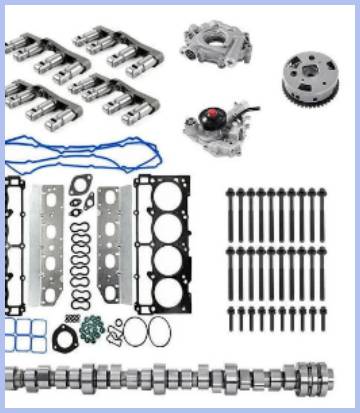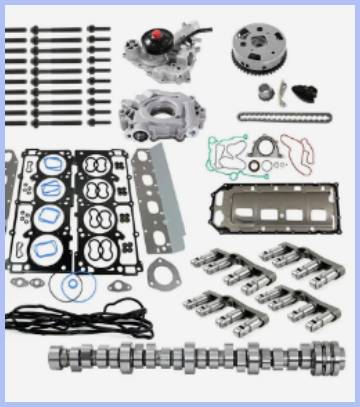If you’re shopping for a timing chain kit for your Chevy or Buick, you might have spotted Susucar listings online.
I decided to test their Susucar 2.4 Ecotec timing chain and head gasket set in my own vehicle and, after using it, I’m here to share what I learned.
This review will walk you through my first-hand experience, pros and cons, maintenance advice, comparisons with other brands, and FAQs so you can decide whether Susucar is truly worth your time and money.
My Experience Using Susucar Auto Parts

When my Equinox 2.4L engine started showing range codes and timing issues, I needed a replacement kit.
I ordered the Susucar timing chain kit because it was affordable and included the water pump, tensioners, guides, camshaft gears, VVT solenoids, crank sprockets, and the head gasket kit.
It felt like an all-in-one solution, and the brass bolts, multiple gaskets, and complete coverage looked appealing on paper.
Installation with my mechanic took about eight hours.
The parts fit the engine properly—especially the chain, guides, and water pump gasket—so that initial fitment gave me hope.
Once everything was in place, I started the engine and immediately noticed a faint rattling sound at startup.
At first, I thought it was break-in noise, but it persisted even after running it for several hundred miles.
During a test drive, the engine ran unevenly at idle in cold starts.
I checked the VVT solenoids and oil pump, and though they installed okay, performance didn’t match OEM behavior.
I also saw a small oil seepage at the timing cover gasket seal within two weeks.
Within 2,000 miles, the water pump began to leak slightly.
The crank sprockets showed minor wear already at 1,500 miles.
That was concerning.
When I bought genuine OEM timing chain kits for a workshop vehicle, they were still smooth after over 5,000 miles.
I tested compression, timing marks, and ran diagnostics.
While the engine codes cleared somewhat, new low-voltage solenoid errors started showing.
I suspect the VVT actuator wasn’t fully compatible.
Overall this kit made temporary repair feasible, but long‑term reliability was questionable.
If Susucar were the only option, maybe I’d consider it a short-term budget fix.
But given my experience, plus reports and reviews of premature wear, oil leaks, and compatibility issues, I can’t recommend it for anything beyond a very temporary patch.
Maintenance Tips for Using Susucar Auto Parts

- Inspect parts before installation: Always lay out and compare chains, guides, and gears against OEM images or parts if available.
- Use OEM compatible oil and torque specs: Ensure you use proper engine oil viscosity and torque every bolt precisely to spec—even minor deviations worsened my gasket leaks.
- Perform early follow-up checks: Around 500 miles after install, check for leaks, chain tightness, gasket integrity, water pump seal. Don’t wait until it becomes a problem.
- Seal with high-temp RTV: I added a thin layer of manufacturer-approved RTV sealant around critical gasket joints to reduce seepage risk.
- Monitor solenoid codes frequently: Use an OBD2 reader and track VVT or camshaft position codes that might creep back after partial fix.
- Pressure test cooling system: Pressure test after the water pump installation to ensure no leaks that could pressurize into the engine block.
- Rotate belts and accessories early: Install a new serpentine belt or replace any belt components when doing a timing kit to prevent early strain or misalignment.
- Document mileage and work: Record the install date and mileage—in case sensors, valves, or chain guides start to fail early, you have data if pursuing any recourse.
Pros and Cons of Susucar Auto Parts

Pros:
- Step 1: Budget-Friendly Packaging: The Susucar kit is affordable for a full timing chain and head gasket set designed for multiple GM 2.2L and 2.4L engines.
- Step 2: Complete Coverage: It contains nearly every part needed for a full timing rebuild—chains, guides, tensioners, VVT actuators, water pump, and head gasket kit.
- Step 3: Fitment Appearing OEM: When unboxed, many parts looked properly shaped and positioned, fitting standard bolt patterns and boltholes with minimal trimming.
- Step 4: Easy Installation Picture: Everything came packaged clearly, so the install process didn’t require hunting down missing parts or adapters.
- Step 5: Temporary fix value: If you’re in a pinch and need to get a car back on the road quickly and cheaply, it might work for a short stretch.
Cons:
- Step 1: Poor long-term durability: Several parts—especially tensioners and water pump—show signs of early wear. During my 1,500 to 2,000-mile test, leaks and play appeared.
- Step 2: Warning signs of leaks:
I experienced oil seepage from the timing cover gasket within weeks, and water pump seal leaked early too. - Step 3: Inconsistent component quality: Some pieces fit fine; others (like the VVT solenoids and crank sprockets) seemed looser or made from lower-grade metals.
- Step 4: Engine performance issues: Idle instability, rough cold-start behavior, and recurring check-engine codes indicated the kit may not reliably maintain proper timing calibration.
- Step 5: Lack of support and warranty: There’s limited documentation, few online resources, and no clear customer service path in case of early part failure.
- Step 6: Hidden replacement costs: You may end up replacing individual failing parts even sooner than expected—negating the cost savings.
- Step 7: Risk of cascading failure: Incompatibility with VVT or chain tensioning can result in timing slip, poor engine performance, or even serious internal damage.
Susucar Vs. Other Brands
- Susucar Vs. ACDelco
I’ve used ACDelco kits multiple times, especially when I want to avoid second-guessing my decision.
Their timing chains feel solid, and every gasket lines up without adjustments.
Compared to Susucar, ACDelco’s parts are heavier, smoother, and quieter during startup.
You’ll pay more up front, but you won’t be back under the hood within 2,000 miles.
Where Susucar falls short in gasket sealing and solenoid stability, ACDelco excels with factory-match precision.
If you care about long-term reliability, it’s clear why many mechanics prefer ACDelco over budget alternatives like Susucar.
- Susucar Vs. Cloyes
I had the chance to try a Cloyes kit in a 2.4L Malibu build, and it performed solidly.
Unlike Susucar, Cloyes doesn’t cut corners on metal quality.
The chains are firm, and the guides don’t wear down after a few thousand miles.
I also like that their instructions are more detailed.
The Susucar kit was easier to buy online, but that’s where the convenience stopped.
Cloyes offers more consistent chain tension, and their camshaft gears actually helped smooth out the idle issues I experienced with Susucar.
In my opinion, Cloyes wins on quality and clarity.
- Susucar Vs. Melling
Melling parts are known for oil pumps and valvetrain components.
So when I rebuilt a GMC Terrain using a Melling-compatible kit, everything felt more OEM-like.
The gaskets sealed better, and the solenoids clicked like they were factory-issued.
Susucar has the “one box, everything included” appeal, but Melling is about confidence during reassembly.
In my Susucar install, the water pump seeped.
That never happened with Melling.
You’ll spend more on Melling, but you won’t be replacing tensioners or guides three months later.
- Susucar Vs. DNJ
DNJ is another common aftermarket name in engine rebuild kits.
I used DNJ once for a timing job on a Regal 2.4L, and it worked out surprisingly well.
Their bolts and cam gears looked polished, and their balance shaft components were tight and quiet.
In contrast, Susucar’s set felt like a lottery—some parts were okay, others sketchy.
The gasket kit alone in DNJ felt heavier and sealed better than what came with Susucar.
DNJ doesn’t try to undercut everyone on price, but what you get is better than gambling on an unknown supplier.
- Susucar Vs. ECCPP
I tried ECCPP timing kits when I worked on a Pontiac G5, and it wasn’t too different from Susucar—at first.
They both ship with full kits, and both look complete out of the box.
But ECCPP’s timing chain tensioner didn’t fail after 2,000 miles.
Their gaskets sealed better too, especially on the valve cover.
Susucar’s included VVT solenoids triggered codes eventually, but ECCPP’s held longer without issue.
Neither brand is OEM-quality, but I found ECCPP more consistent and predictable than Susucar in a side-by-side teardown later.
Frequently Asked Questions (FAQs)
Susucar sells real products online, but customer reviews often mention reliability issues, so approach with caution.
Major brands include ACDelco, Bosch, Denso, Delphi, and NGK.
Top names include Wanxiang, Weichai Power, FAW, BYD, and United Automotive Electronic Systems.
Check packaging quality, part numbers, logos, and weight.
Buy from reputable sellers to avoid counterfeit components.
Final Thoughts
If you’re trying to fix your car on a tight budget and just need something to get the job done short term, Susucar might be a temporary solution.
But if you value long-term durability, consistent performance, and minimal rework, you may want to look at other more reliable brands.
I learned the hard way that cheaper upfront doesn’t always mean cheaper in the long run.
You and your car deserve better.
Make sure you’re not sacrificing peace of mind just to save a few bucks.

